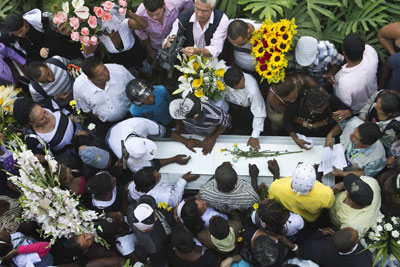To be a journalist in Colombia, in a city like Medellín, is not easy — even less so if you cover issues related to narcotrafficking.
Despite efforts by the authorities to control outbreaks of violence linked to drug trafficking, especially in the city’s poorest neighborhoods, the situation isn’t improving. According to the prosecutor’s office, Medellín has the highest homicide rate in the country and one of the worst in Latin America.
The origin of the violence – which includes fighting in the streets with long-range weapons, –and has left hundreds dead — is that there is currently no one kingpin who dominates the territory. Since the 2008 extradition to the United States of Diego Fernando Murillo, alias “Don Berna” — a former paramilitary member and narcotrafficker who led the criminal organization known as the “Office of Envigado” — many have wanted to take his place, sparking a war between factions.
Of course, controlling a city like Medellín requires not only having power in the underworld, but also in the important spheres of society. Thus these characters have politicians, businessmen and members of the security forces, especially the police, on their “payroll.”
Reporting on the daily events that are products of this war, such as fighting or deaths, does not bring so many problems. But something else happens when journalists dare to delve into the causes and consequences of these events. The first thing that happens is lack of cooperation on the part of some local authorities, who are worried about keeping up an image that is very far from reality. Reporting on these events in detail is bothersome to them, and you become persona non grata.
The other, more delicate problem is when the “warlords” feel themselves affected, and that is when the messages, warning phone calls, threats, and even attacks, begin.
On June 11, 2011, I saw my life and everything that I had constructed until that moment fall apart. That was the day my article about alliances between drug traffickers was published. I titled it “¿Un nuevo capo en Medellín?” (“New chief in Medellín?”), and from that moment on I began receiving calls from my sources who warned me that I was in danger.
On May 18, I had published another article, “Y ahora las polibandas,” (“And now the ‘polibandas'”) in which I revealed links between drug traffickers and some members of the police, a connection known as “polibandas.” A month later, on June 19, it was revealed that three policemen had been fired and that an investigation was underway involving another 120. The people that had given me information warned me that there was discord due to the article and its consequences.
On June 22, a close source received a phone call that had a message for me: “Tell your friend the journalist Mary Luz to stop publishing stupid things, or does she want to win the jackpot?” They were no longer only warnings, they had transformed into threats. The authorities’ investigations showed that the author of these threats was the drug trafficker known as “Mi Sangre” (“My Blood” ), of whom I had written in the article “A new chief in Medellín?” He also asked the newspaper to publish a correction, and when management refused, he said he would sue.
The newspaper received various phone calls from people trying to find out my whereabouts, the warnings continued, and the recommendation was to leave the country, even though I had been granted a full-time police escort. According to the Medellín police chief, anyone could take advantage of the situation to hurt me, as the articles I had written in past year had caused discomfort in many sectors.
On August 10, I heeded the recommendation and with the help of various international press freedom organizations, among them CPJ, I left the country. How long will I be gone? I don’t know. Where will I go? I don’t know that either — just as I don’t know what will happen from here on out with my professional life, nor what to say of the family that stayed in Medellín and the loneliness that is my only companion.
The only things that are always with me are uncertainty – and the conviction that I did the right thing. If it was worth it or not is another question, but I have no doubt that I would do it again because it is my job. I am a journalist and people have a right to know what is happening.Reporting on drug traffickers, guerrillas and paramilitaries has been 14 years of my professional life. Of course there have been other threats, and even a week-long kidnapping in the hands of the FARC, but in those days you know who to talk to. That is no longer the case, and the people who are pursuing me have nothing to lose. That is why now it is different and although some think this is cowardice, if they kill me I cannot continue to be a journalist. At least for now I have the hope that someday I will be one again.
